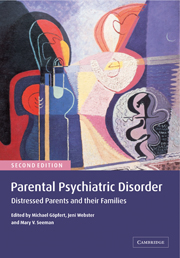Book contents
- Frontmatter
- Contents
- List of contributors
- Foreword
- Preface
- Part I Basic issues
- Part II Comprehensive assessment and treatment
- Part III Specific disorders: the impact on parent–child relationships
- Part IV Specific treatments and service needs
- Part V Child-sensitive therapeutic interventions
- 20 The child grown up: ‘on being and becoming mindless’: a personal account
- 21 Talking with children and their understanding of mental illness
- 22 Family therapy when a parent suffers from psychiatric disorder
- Part VI Models for collaborative services and staff training
- Afterword
- Index
- References
21 - Talking with children and their understanding of mental illness
from Part V - Child-sensitive therapeutic interventions
Published online by Cambridge University Press: 09 August 2009
- Frontmatter
- Contents
- List of contributors
- Foreword
- Preface
- Part I Basic issues
- Part II Comprehensive assessment and treatment
- Part III Specific disorders: the impact on parent–child relationships
- Part IV Specific treatments and service needs
- Part V Child-sensitive therapeutic interventions
- 20 The child grown up: ‘on being and becoming mindless’: a personal account
- 21 Talking with children and their understanding of mental illness
- 22 Family therapy when a parent suffers from psychiatric disorder
- Part VI Models for collaborative services and staff training
- Afterword
- Index
- References
Summary
Introduction
The title of this chapter highlights an important starting point for what follows. All children with mentally ill parents construct some form of understanding about changes they observe in their parents' behaviour. If professionals are to talk helpfully to a child about his parent's illness, the talk needs to be a dialogue or dialectic between the different knowledge and understanding of the child on one hand and the professional on the other. In other words, it is no use just ‘telling’ the child – the professional needs to try to find out how the child understands what has happened to his mother, father, brother or sister, to talk about how he has worked it out, and then to fit the professional's knowledge into the discussion.
What to talk to children about
In a study of 11–15-year-olds living with a depressed parent, Garley et al. (1997) found that the children particularly wanted discussions about the following four topics:
Understanding the illness. This would include their own concerns, ideas about the cause of the illness in their parent, and access to information.
How to recognize the signs of an impending illness.
Issues to do with hospitalization.
Advice about management of the illness. This would include ideas about coping with the effect of illness on themselves as well as on their parent, suggestions about what is helpful to the parent and recommendations for other children whose parents are suffering from similar problems.
- Type
- Chapter
- Information
- Parental Psychiatric DisorderDistressed Parents and their Families, pp. 292 - 305Publisher: Cambridge University PressPrint publication year: 2004
References
- 4
- Cited by

